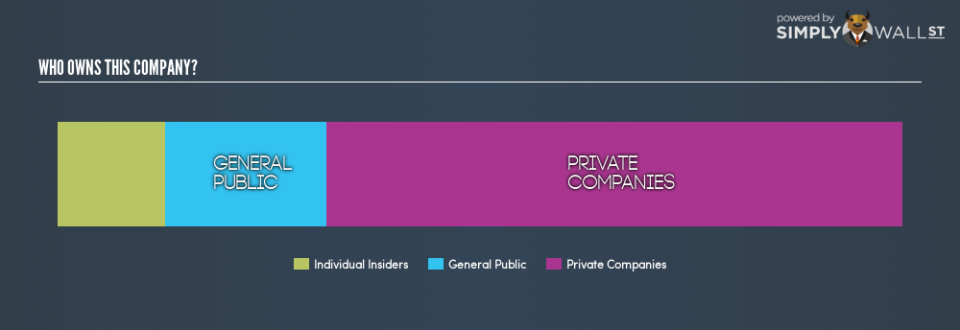Do Insiders Own Lots Of Shares In Unisplendour Technology (Holdings) Limited (HKG:365)?

Want to participate in a short research study? Help shape the future of investing tools and you could win a $250 gift card!
If you want to know who really controls Unisplendour Technology (Holdings) Limited (HKG:365), then you’ll have to look at the makeup of its share registry. Insiders often own a large chunk of younger, smaller, companies while huge companies tend to have institutions as shareholders. I quite like to see at least a little bit of insider ownership. As Charlie Munger said ‘Show me the incentive and I will show you the outcome.’
Unisplendour Technology (Holdings) is a smaller company with a market capitalization of HK$2.5b, so it may still be flying under the radar of many institutional investors. In the chart below below, we can see that institutions don’t own shares in the company. We can zoom in on the different ownership groups, to learn more about 365.
See our latest analysis for Unisplendour Technology (Holdings)
What Does The Lack Of Institutional Ownership Tell Us About Unisplendour Technology (Holdings)?
Institutional investors often avoid companies that are too small, too illiquid or too risky for their tastes. But it’s unusual to see larger companies without any institutional investors.
There could be various reasons why no institutions own shares in a company. Typically, small, newly listed companies don’t attract much attention from fund managers, because it would not be possible for large fund managers to build a meaningful position in the company. Alternatively, there might be something about the company that has kept institutional investors away. Unisplendour Technology (Holdings)’s earnings and revenue track record (below) may not be compelling to institutional investors — or they simply might not have looked at the business closely.
Hedge funds don’t have many shares in Unisplendour Technology (Holdings). Our information suggests that there isn’t any analyst coverage of the stock, so it is probably little known.
Insider Ownership Of Unisplendour Technology (Holdings)
The definition of company insiders can be subjective, and does vary between jurisdictions. Our data reflects individual insiders, capturing board members at the very least. Management ultimately answers to the board. However, it is not uncommon for managers to be executive board members, especially if they are a founder or the CEO.
Most consider insider ownership a positive because it can indicate the board is well aligned with other shareholders. However, on some occasions too much power is concentrated within this group.
It seems insiders own a significant proportion of Unisplendour Technology (Holdings) Limited. Insiders own HK$320m worth of shares in the HK$2.5b company. This may suggest that the founders still own a lot of shares. You can click here to see if they have been buying or selling.
General Public Ownership
The general public holds a 19% stake in 365. While this size of ownership may not be enough to sway a policy decision in their favour, they can still make a collective impact on company policies.
Private Company Ownership
It seems that Private Companies own 68%, of the 365 stock. It might be worth looking deeper into this. If related parties, such as insiders, have an interest in one of these private companies, that should be disclosed in the annual report. Private companies may also have a strategic interest in the company.
Next Steps:
While it is well worth considering the different groups that own a company, there are other factors that are even more important.
I always like to check for a history of revenue growth. You can too, by accessing this free chart of historic revenue and earnings in this detailed graph.
Of course this may not be the best stock to buy. So take a peek at this free free list of interesting companies.
NB: Figures in this article are calculated using data from the last twelve months, which refer to the 12-month period ending on the last date of the month the financial statement is dated. This may not be consistent with full year annual report figures.
To help readers see past the short term volatility of the financial market, we aim to bring you a long-term focused research analysis purely driven by fundamental data. Note that our analysis does not factor in the latest price-sensitive company announcements.
The author is an independent contributor and at the time of publication had no position in the stocks mentioned. For errors that warrant correction please contact the editor at editorial-team@simplywallst.com.


